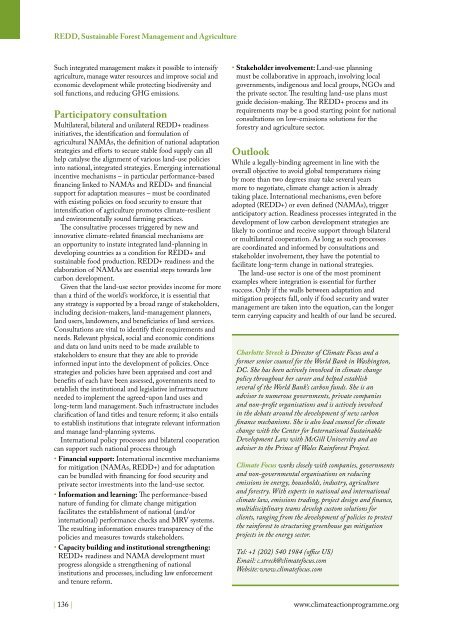Climate Action 2010-2011
Create successful ePaper yourself
Turn your PDF publications into a flip-book with our unique Google optimized e-Paper software.
Redd, Sustainable Forest Management and Agriculture<br />
Such integrated management makes it possible to intensify<br />
agriculture, manage water resources and improve social and<br />
economic development while protecting biodiversity and<br />
soil functions, and reducing GHG emissions.<br />
Participatory consultation<br />
Multilateral, bilateral and unilateral REDD+ readiness<br />
initiatives, the identification and formulation of<br />
agricultural NAMAs, the definition of national adaptation<br />
strategies and efforts to secure stable food supply can all<br />
help catalyse the alignment of various land-use policies<br />
into national, integrated strategies. Emerging international<br />
incentive mechanisms – in particular performance-based<br />
financing linked to NAMAs and REDD+ and financial<br />
support for adaptation measures – must be coordinated<br />
with existing policies on food security to ensure that<br />
intensification of agriculture promotes climate-resilient<br />
and environmentally sound farming practices.<br />
The consultative processes triggered by new and<br />
innovative climate-related financial mechanisms are<br />
an opportunity to instate integrated land-planning in<br />
developing countries as a condition for REDD+ and<br />
sustainable food production. REDD+ readiness and the<br />
elaboration of NAMAs are essential steps towards low<br />
carbon development.<br />
Given that the land-use sector provides income for more<br />
than a third of the world’s workforce, it is essential that<br />
any strategy is supported by a broad range of stakeholders,<br />
including decision-makers, land-management planners,<br />
land users, landowners, and beneficiaries of land services.<br />
Consultations are vital to identify their requirements and<br />
needs. Relevant physical, social and economic conditions<br />
and data on land units need to be made available to<br />
stakeholders to ensure that they are able to provide<br />
informed input into the development of policies. Once<br />
strategies and policies have been appraised and cost and<br />
benefits of each have been assessed, governments need to<br />
establish the institutional and legislative infrastructure<br />
needed to implement the agreed-upon land uses and<br />
long-term land management. Such infrastructure includes<br />
clarification of land titles and tenure reform; it also entails<br />
to establish institutions that integrate relevant information<br />
and manage land-planning systems.<br />
International policy processes and bilateral cooperation<br />
can support such national process through<br />
• Financial support: International incentive mechanisms<br />
for mitigation (NAMAs, REDD+) and for adaptation<br />
can be bundled with financing for food security and<br />
private sector investments into the land-use sector.<br />
• Information and learning: The performance-based<br />
nature of funding for climate change mitigation<br />
facilitates the establishment of national (and/or<br />
international) performance checks and MRV systems.<br />
The resulting information ensures transparency of the<br />
policies and measures towards stakeholders.<br />
• Capacity building and institutional strengthening:<br />
REDD+ readiness and NAMA development must<br />
progress alongside a strengthening of national<br />
institutions and processes, including law enforcement<br />
and tenure reform.<br />
• Stakeholder involvement: Land-use planning<br />
must be collaborative in approach, involving local<br />
governments, indigenous and local groups, NGOs and<br />
the private sector. The resulting land-use plans must<br />
guide decision-making. The REDD+ process and its<br />
requirements may be a good starting point for national<br />
consultations on low-emissions solutions for the<br />
forestry and agriculture sector.<br />
Outlook<br />
While a legally-binding agreement in line with the<br />
overall objective to avoid global temperatures rising<br />
by more than two degrees may take several years<br />
more to negotiate, climate change action is already<br />
taking place. International mechanisms, even before<br />
adopted (REDD+) or even defined (NAMAs), trigger<br />
anticipatory action. Readiness processes integrated in the<br />
development of low carbon development strategies are<br />
likely to continue and receive support through bilateral<br />
or multilateral cooperation. As long as such processes<br />
are coordinated and informed by consultations and<br />
stakeholder involvement, they have the potential to<br />
facilitate long-term change in national strategies.<br />
The land-use sector is one of the most prominent<br />
examples where integration is essential for further<br />
success. Only if the walls between adaptation and<br />
mitigation projects fall, only if food security and water<br />
management are taken into the equation, can the longer<br />
term carrying capacity and health of our land be secured.<br />
Charlotte Streck is Director of <strong>Climate</strong> Focus and a<br />
former senior counsel for the World Bank in Washington,<br />
DC. She has been actively involved in climate change<br />
policy throughout her career and helped establish<br />
several of the World Bank’s carbon funds. She is an<br />
advisor to numerous governments, private companies<br />
and non-profit organisations and is actively involved<br />
in the debate around the development of new carbon<br />
finance mechanisms. She is also lead counsel for climate<br />
change with the Center for International Sustainable<br />
Development Law with McGill University and an<br />
adviser to the Prince of Wales Rainforest Project.<br />
<strong>Climate</strong> Focus works closely with companies, governments<br />
and non-governmental organisations on reducing<br />
emissions in energy, households, industry, agriculture<br />
and forestry. With experts in national and international<br />
climate law, emissions trading, project design and finance,<br />
multidisciplinary teams develop custom solutions for<br />
clients, ranging from the development of policies to protect<br />
the rainforest to structuring greenhouse gas mitigation<br />
projects in the energy sector.<br />
Tel: +1 (202) 540 1984 (office US)<br />
Email: c.streck@climatefocus.com<br />
Website: www.climatefocus.com<br />
| 136 |<br />
www.climateactionprogramme.org












